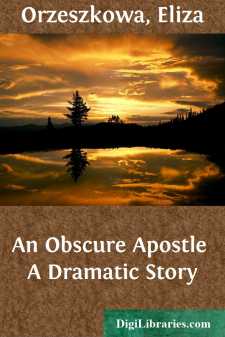Categories
- Antiques & Collectibles 13
- Architecture 36
- Art 48
- Bibles 22
- Biography & Autobiography 813
- Body, Mind & Spirit 142
- Business & Economics 28
- Children's Books 15
- Children's Fiction 12
- Computers 4
- Cooking 94
- Crafts & Hobbies 4
- Drama 346
- Education 46
- Family & Relationships 57
- Fiction 11828
- Games 19
- Gardening 17
- Health & Fitness 34
- History 1377
- House & Home 1
- Humor 147
- Juvenile Fiction 1873
- Juvenile Nonfiction 202
- Language Arts & Disciplines 88
- Law 16
- Literary Collections 686
- Literary Criticism 179
- Mathematics 13
- Medical 41
- Music 40
- Nature 179
- Non-Classifiable 1768
- Performing Arts 7
- Periodicals 1453
- Philosophy 64
- Photography 2
- Poetry 896
- Political Science 203
- Psychology 42
- Reference 154
- Religion 513
- Science 126
- Self-Help 84
- Social Science 81
- Sports & Recreation 34
- Study Aids 3
- Technology & Engineering 59
- Transportation 23
- Travel 463
- True Crime 29
An Obscure Apostle A Dramatic Story
by: Eliza Orzeszkowa
Description:
Excerpt
PREFACE
ELIZA ORZESZKO
In Lord Palmerston's days, the English public naturally heard a great deal about Poland, for there were a goodly number of Poles, noblemen and others, residing in London, exiles after the unsuccessful revolution, who, believing that England would help them to recover their lost liberty, made every possible effort to that end through Count Vladislas Zamoyski, the prime minister's personal friend. But even in those times, when the English press was writing much about the political situation in Poland, little was said about that which constitutes the greatest glory of a nation, namely, its literature and art, which alone can be secure of immortality. Only lately, in fact, has any public attention been paid by English people to Polish literature. However, among the authors who have attracted considerable attention of late, is the writer of "By Fire and Sword," whose "Quo Vadis," has met with a phenomenal reception. Henryk Sienkiewicz has by his popularity proved that in unfortunate, almost forgotten, Poland, there is an abundance of literary talent and an important output of works of which few English readers have any conception. For instance, who has ever heard, in Great Britain, of Adam Michiewicz the great Polish poet, who, critics declare, can be placed in the same category with Homer, Virgil, Dante, Tasso, Klopstock, Camoens, and Milton? Joseph Kraszewski as a novel writer occupies in Poland as high a position as Maurice Jokai does in Hungarian literature, while Mme. Eliza Orzeszko is considered to be the Polish Georges Sand, even by the Germans, who are in many respects the rivals of Slavs in politics and literature.
Henryk Sienkiewicz, asked by an interviewer what he thought about the contemporary Polish literary talents, replied: "At the head of all stand Waclaw Sieroszewski and Stefan Zeromski; they are young, and very promising writers. But Eliza Orzeszko still holds the sceptre as a novelist."
When the "Revue des Deux Mondes" asked the authors of different nationalities to furnish an essay on women of their respective countries, Mme. Orzeszko was chosen among the Polish writers to write about the Polish women. It may be stated that translations of her novels appeared in the same magazine more than twenty years ago. She is not only a talented but also a prolific writer. She has suffered much in her life, and her sufferings have brought out those sterling qualities of soul and heart, which make her books so intensely human, and characterise all her works, and place her high above contemporary Polish writers. The present volume may stand as a proof of her all-embracing talent.
C.S. DE SOISSONS.
INTRODUCTION
On the summits of civilisation the various branches of the great tree of humanity are united and harmonised. Education is the best apostle of universal brotherhood. It polishes the roughness without and cuts the overgrowth within; it permits of the development, side by side and with mutual respect, of the natural characteristics of different individuals; it prunes even religious beliefs produced by the needs of the time, and reduces them to their simplest expression, the result being that people can live without antipathies....


